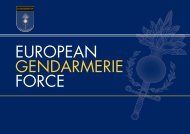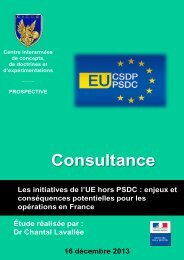Conference
science-research-bulletin-2013-conference
science-research-bulletin-2013-conference
You also want an ePaper? Increase the reach of your titles
YUMPU automatically turns print PDFs into web optimized ePapers that Google loves.
EUROPEAN POLICE SCIENCE AND RESEARCH BULLETIN<br />
SPECIAL CONFERENCE EDITION<br />
was designed by an interdisciplinary research<br />
team (psychology, biomedical and electro<br />
technical engineers) and it combined wearable<br />
electrocardiogram and mobile devices, ready to<br />
assess stress and coping among police officers<br />
during daily life experience (Kaiseler, Rodrigues,<br />
Ribeiro, Aguiar, & Cunha, 2013; Trull & Ebner-<br />
Priemer, 2013). The ambulatory method is<br />
currently being tested in the city of Porto,<br />
Portugal by the third author of this paper.<br />
2. SCOPE AMBULATORY<br />
METHOD: ASSESSING STRESS<br />
AND COPING IN REAL WORLD<br />
SCENARIOS AMONG POLICE<br />
OFFICERS<br />
The innovated and interdisciplinary SCOPE<br />
method proposes a disruptive technology to<br />
investigate stress and coping strategies used by<br />
police officers working in real world scenarios.<br />
Ambulatory Assessment is a recent promising<br />
research tool that minimises retrospective biases<br />
while gathering ecologically valid data, including<br />
self-reports, physiological or biological data<br />
and observed behavior. It has been successfully<br />
used across different settings of occupation<br />
health (Trull & Ebner-Priemer, 2013). Thus, the<br />
current method combines physiological and<br />
psychological measures of stress and coping,<br />
combining user-friendly and non-intrusive<br />
technology, adapted to Police Officers real world<br />
needs. Vital Jacket® (VJ) (Cunha, 2012) and<br />
electronic diaries held on mobile android phones<br />
including GPS (Gomes et al., 2012) are used to<br />
collect physiological (HRV) and psychological<br />
measures as well as location where the event<br />
occur. In this way, police officers use the VJ on a<br />
daily basis as well as mobile devices containing<br />
electronic diaries; data is therefore being collected<br />
throughout the day. Theoretical implications of<br />
this research will advance the international stateof-art<br />
in the area of stress and coping among<br />
police officers. Particularly, findings will allow<br />
us to fully understand what are the stressors<br />
experienced by police officers working in real<br />
world scenarios and their psychophysiological<br />
impact on the individual as well as the coping<br />
strategies being used to tackle each stressor.<br />
Applied implications of the research will allow<br />
the design of evidence based stress management<br />
interventions, developing the health and<br />
wellbeing of police officers, and increasing the<br />
safeguard of the overall community. Additionally,<br />
this method may be a promising tool to develop<br />
future comparative occupational health studies<br />
among police officers in Europe.<br />
REFERENCES<br />
Benyon, J. (1994). Policing the European Union: the changing basis of cooperation on law enforcement.<br />
International Affairs, 70(3), 497-517.<br />
Biggam, F.H., Power, K.G., Macdonald, R.R., Carcaldy, W.B., & Moodie, E. (1997). Self-perceived<br />
occupational stress and distress in a Scottish police force. Work & Stress, 11(2), 118-133.<br />
Cunha, J.P.S. (2012). Health and Wearable Technologies: a permanent challenge. In B. Blobel, P.<br />
Pharow P & F. Sousa (Eds.). Studies in Health Technology and Informatics — Health. Proceedings of<br />
the 9th International <strong>Conference</strong> on Wearable Micro and Nano Technologies for Personalised Health<br />
(pp. 185-195). Amsterdam: IOS Press.<br />
Gomes, P.T., Kaiseler, M., Queirós, C., Oliveira, M., Lopes, B., Coimbra, M. (2012). Vital Analysis:<br />
Annotating sensed physiological signals with the stress levels of first responders in action. In<br />
Proceedings of the 34th Annual International IEEE EMBC, 6695-6698.<br />
Kaiseler, M., Rodrigues, S., Ribeiro, V., Aguiar, A., & Cunha, J.P.S. (2013, June). Ambulatory Assessment<br />
of stress and coping among Portuguese police officers. Poster presented at 3rd <strong>Conference</strong> of Society<br />
of Ambulatory Assessment. Amsterdam.<br />
Kop, N., Euwema, M. C., & Schaufeli, W. (1999). Burnout, job stress, and violent behaviour among<br />
Dutch police officers, Work and Stress, 13, 326–340. doi:10.1080/02678379950019789<br />
141





